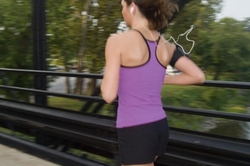
Exercise is a common prescription for insomnia. But spending 45 minutes on the treadmill one day won’t translate into better sleep that night, according to new Northwestern Medicine® research.
“If you have insomnia you won’t exercise yourself into sleep right away,” said lead study author Kelly Glazer Baron, PhD, a clinical psychologist and director of the behavioral sleep program at Northwestern University Feinberg School of Medicine. “It’s a long-term relationship. You have to keep at it and not get discouraged.”
This is the first long-term study to show aerobic exercise during the day does not result in improved sleep that same night when people have existing sleep problems. Most studies on the daily effects of exercise and sleep have been done with healthy sleepers.
The study also showed people exercise less following nights with worse sleep.
“Sleeping poorly doesn’t change your aerobic capacity, but it changes people’s perception of their exertion,” Baron said. “They feel more exhausted.”
The study was published August 15 in the Journal of Clinical Sleep Medicine. Baron conducted the study with coauthor Kathryn Reid, PhD, research associate professor of neurology at Feinberg and senior author Phyllis Zee, MD, PhD, the Benjamin and Virginia T. Boshes Professor of Neurology at Feinberg and director of the Sleep Disorders Center at Northwestern Memorial Hospital.
“This new study shows exercise and sleep affect each other in both directions: regular long-term exercise is good for sleep, but poor sleep can also lead to less exercise. So in the end, sleep still trumps everything as far as health is concerned,” Zee said.
Baron decided to analyze the daily effect of exercise after hearing her patients with insomnia complain the exercise she recommended didn’t help them right away.
“They’d say, ‘I exercised so hard yesterday and didn’t sleep at all,’” Baron said. “The prevailing thought is that exercise improves sleep, but I thought it probably wasn’t that simple for people with insomnia.”
Why does it take time for exercise to impact sleep?
“Patients with insomnia have a heightened level of brain activity and it takes time to re-establish a more normal level that can facilitate sleep,” Zee said. “Rather than medications, which can induce sleep quickly, exercise may be a healthier way to improve sleep because it could address the underlying problem.”
The study participants were older women, who have the highest prevalence of insomnia. Exercise is an optimum approach to promote sleep in an older population because drugs can cause memory impairment and falls. Baron thinks the results also could apply to men because there is no evidence of gender differences in behavioral treatments for insomnia.
For the study, Baron performed an analysis of data from a 2010 clinical trial (by the same group of Northwestern researchers on the current paper) that demonstrated the ability of aerobic exercise to improve sleep, mood, and vitality over a 16-week period in middle-age-to-older adults with insomnia. She and colleagues examined the daily sleep data from 11 women ages 57 to 70.
The key message is that people with sleep disturbances have to be persistent with exercise.
“People have to realize that even if they don’t want to exercise, that’s the time they need to dig in their heels and get themselves out there,” Baron said. “Write a note on your mirror that says ‘Just Do It!’ It will help in the long run.”
This study was supported by National Institute of Health grants T32AG020506 and P01 AG11412 from the National Institute on Aging; 1K23HL109110 and K23 HL091508 from the National Heart, Lung and Blood Institute; and grants M01 RR00048 and UL1RR025741 from the National Center for Advancing Translational Science.






